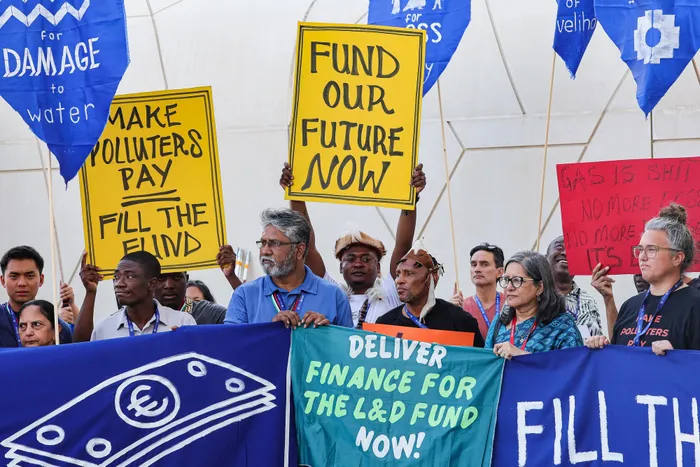Climate finance deal crucial for technology and transition

Picture: Giuseppe Cacace / AFP / Taken on December 6, 2023 – Environmental activists display placards during a demonstration at the COP28 United Nations climate summit in Dubai this week demanding reparation and financing for nations severely impacted by severe weather disasters.
By Sizo Nkala
The world is gathering in Dubai, in the United Arab Emirates (UAE), for the 28th annual UN’s Framework Convention on Climate Conference of the Parties (COP28).
The gathering brings together diverse stakeholders, among them are government leaders, the private sector, civil society and scientists, in the quest to limit global warming below 1.5°C above the pre-industrial levels as agreed in Paris, France, in 2015.
Scientists believe that breaching the 1.5°C threshold will destabilise the global climate system, accelerate global warming and increase the frequency, scale and severity of devastating climate change disasters such as floods, droughts, and heatwaves.
As such, to keep the global temperature increase below the threshold, the world needs to drastically cut the emission of greenhouse gases such as carbon dioxide, methane and nitrous oxide whose saturation in the atmosphere has been pointed to as the main cause of global warming.
Alarmingly, the global emission of carbon dioxide from fossil fuels increased by 1 percent last year, despite the enormous resources invested in raising awareness of the dangers of continued emissions and past agreements to reduce emissions.
Consequently, the UN Intergovernmental Panel on Climate Change (IPCC) has warned that if progress is not made in reducing the current levels of emissions, global warming will reach or surpass the dreaded 1.5°C mark by the early 2030s.
Hence, finding ways of cutting down emissions will be a major bone of contention at the COP28.
The IPCC has said that the world needs to cut emissions by 50 percent to keep global warming below 1.5°C.
Cutting emissions means significantly reducing reliance on fossil fuels such as oil, gas and coal, on which many countries depend for their energy supplies.
Some parties, such as the EU, with the UN secretary-general’s support, have called for the phasing out of fossil fuels as the only viable solution to reduce emissions.
A draft document produced at the discussions in COP28 urges parties to implement an orderly and just phase-out of fossil fuels.
However, there has been a pushback from powerful interests who earn enormous profits from the exploitation of fossil fuels.
For example, the president of COP28, Sultan Ahmed Al Jaber,
who also serves as the head of the UAE’s state-owned oil company, Adnoc, was quoted as saying: “There is no science out there, or no scenario out there, that says that the phase-out of fossil fuel is what’s going to achieve 1.5°C.”
His statement is backed by other oil-dependent nations such as Saudi Arabia, China, India, and most developing countries that do not have viable alternatives to fossil fuels for energy security. As such, it is unlikely that COP28 will produce any stronger commitment towards eliminating the use of fossil fuels that is driving global warming.
Nonetheless, there are areas where the parties are likely to come to an agreement such as increasing the global renewable energy capacity by 200 percent, which will see it increase from 3 400 gigawatts to 10 200GW.
More innovation is needed to make renewable energy sources such as wind, solar and hydropower more accessible and affordable.
Climate finance will also be a central issue at the conference.
More notable is the coming into effect of the loss and damage fund that was announced at COP27 in Egypt.
The fund is earmarked to disburse financial assistance to developing countries suffering the damaging effects of climate change. It relies on financial injections from rich and industrialised countries whose industrialisation in the past two centuries is blamed for contributing to climate change.
However, some countries, like the US, have denounced the logic and denied responsibility for causing climate change. Such attitudes will undermine the viability of the fund as some of the developed countries will be reluctant to participate.
Moreover, another significant issue on the agenda of COP28 will be the $100 billion climate finance pledged by the developed countries in 2009 to help developing countries adapt to and mitigate the effects of climate change. This pledge is yet to materialise 14 years on.
It is important for COP28 delegates to find ways of expediting climate finance deal to restore trust between the developed and developing countries which would go a long way in sustaining the global fight against climate change.
Without the climate finance, developing countries, especially in Africa, will find it difficult to adopt clean technologies and transition to greener economies.
Innovation and efficient and rapid transfer of technology will be crucial to addressing the climate change phenomenon.
Hence, COP28 has to figure out ways of ensuring that clean technologies are disseminated rapidly and at affordable prices to help countries reduce their carbon emissions.
Overall, due to the current geo-political tension between the world’s major powers, it does not look like COP28 will push the world towards a greener future in any significant way.
Dr Sizo Nkala is a Research Fellow at the University of Johannesburg’s Centre for Africa-China Studies